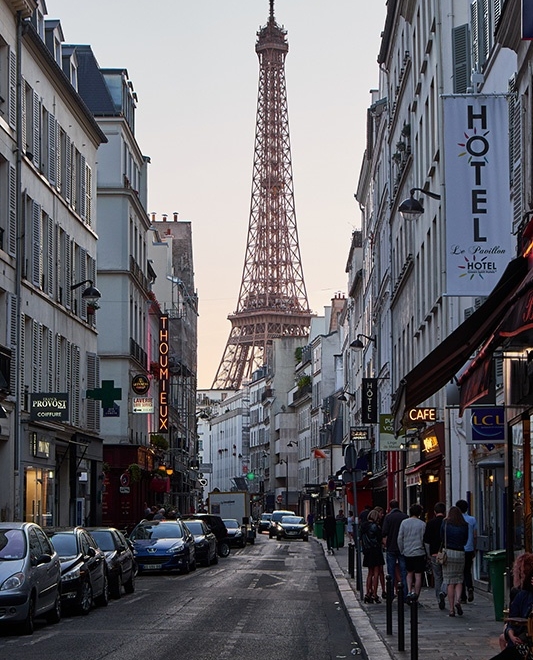Security is a Brand Differentiator for Hospitality Companies

As the global risk environment becomes more unpredictable, the hospitality industry faces new customer expectations, more complex operations, and a demand for broadly integrated security measures.
By 2026, the burgeoning information overload we’re experiencing now will be the norm. Even more than it is now, information will have the potential to be weaponized, and believable misinformation will threaten to brand security and reputation. [1] Individuals hyper-empowered by social media and disintermediation are – and will remain – the greatest threat to hospitality brands of every size (from mom and pop to global chain) and type (from traditional to peer-to-peer). The constancy of the global news cycle only fuels the challenge. In particular, any security breach – whether direct or in their operating environment – puts the company’s brand at risk, disrupts their operations, and demands that they transform their oversight and governance.
For the hospitality industry, evolving to secure against the escalating global threat environment is of critical importance.
Future-focused hospitality companies have begun to transform their operations to weather these increasing numbers and complexities of threats. They understand the importance of a public perception of security to their brand, and how rapidly that perception can spread and shift. In this environment, security cannot remain a cost line on the P&L statement. It’s an absolute necessity that permeates every department in the organization
Not only does shifting security from a siloed function to a cross-functional one stabilize the organization, but it can also differentiate and preserve the brand. Consumers are aware that attacks can happen at any time. They actively seek evidence of proactive measures to create and maintain a secure environment. In the past year, we’ve seen the substantial economic damage that a terror attack can have on the hospitality businesses in the area:
- Following the attacks in Nice, France, hotels experienced 13 consecutive months of Revenue per available room (RevPAR) declines [2]
- RevPAR decreased 18% in Brussels due to the terror attacks and an extended lock-down[3]
- Hotels in major Indian cities experienced 60% occupancy decrease following the Mumbai attacks[4]
- Paris has lost at least $1 Billion in tourism revenue following the city’s horrific terrorist attacks [5]
Take a holistic approach to the security of your people, your brand, and your future.
The first step in securing against the unpredictable and growing number of threat implications in your environment is to take a deeper look at your internal and external risks. The most efficient way to approach this massive task is to take a holistic approach to integrating security across the organization, and a focused approach to identifying your critical assets and who wants to target them now and over time.
Imagine the following scenario –
A terrorist organization, angry at the treatment of local employees in their region, has plans to conduct an attack on the ICS systems across 10 properties in five European countries. Taking advantage of vulnerabilities to the network, the terrorists are able to turn on the fire alarms and sprinklers at each property in the middle of the night. They access locking mechanisms, shutting down various exits throughout the property and funneling guests to the main entrance. Then, using vehicles that appeared to be first-responders, they are able to detonate a number of explosives at the main entrance, causing massive casualties and damage to property, long before actual first-responders could arrive.
As similar events occur globally, securing a hospitality brand in the face of growing threat variables becomes more complex. In the face of these pressures, Toffler Associates recommends keeping six key tenets in mind.
- The number of potential vulnerabilities is growing.
Threat actors or disruptors to your business operations, customers, and revenue opportunities are varied. Each potential threat to your business is motivated differently, weaponizes differently, and attacks differently. Consider how those changes might happen to stay prepared and agile. - The public perception of security is more important than the reality of the security.
A threat event changes the public perception about the safety of travel. Regardless of whether travel is occurring in the same location as the event, close by or miles away, and regardless of the actual level of safety or countermeasures, the public will change its buying and traveling behavior for a time. - Even if the general public were the target of an attack, the venue and organization would feel the impact. Although not the ultimate target, the organization where an attack happens will suffer an adverse impact on its brand, reputation, and ability to generate revenue. Particularly in our era of visual news and storytelling, the name on the building becomes inextricably associated with the event.
- The nature of threats is complex.
Systems of individuals and organized groups form large, widely dispersed networks of like-minded actors who share intent to cause harm. Their ability to join forces adds severity to the disruption they can cause and makes it incredibly difficult to disarm efforts. - Increased automation, machine-to-machine communication, and systems connections create more vulnerabilities.
Each system used to streamline operations and experience is vulnerable to breach. The connection nodes between them compound potential vulnerabilities. As a consequence of the very effort to prevent risk, an organization could be providing additional avenues to exploit. - Perception of safety still drives behavior.
Despite evolutions in technology and methods for disruption and the associated mechanisms for protection, the public perception of safety still drives behavior. In the wake of an event that amasses causalities, hospitality performance metrics will reflect customers’ apprehension.
The time has come to think differently about security.
Threat is complex and ubiquitous, and vulnerabilities to your most valuable assets are increasing. In such a tumultuous global environment, it’s vital to position your brand for strength against potential events, vulnerabilities – and perceptions – that could erode it. The perception or your brand drives revenue and security is a differentiator.
Proactive strategies exist to protect your brand, mark, and market share. Toffler Associates can help you prepare for impactful and disruptive events today. Combined with our deep understanding of drivers shaping the future and our ALTERNATE FUTURES® scenario planning approach, we have begun to imagine what security and protection will look like in the near and long term future for the hospitality industry. Rather than focusing on the threat and fear that characterizes our global environment, we take a strategic and successful approach to securing hospitality businesses. That holistic, future-focused effort engages proven tactical efforts like near term table top exercises to explore and plan for impactful and disruptive scenarios, and long term analysis of the environmental trends, development of drivers of change shaping the future, and identification of the future worlds and the threats and opportunities expected.
The time has come to take proactive measures to secure the future of your hospitality organization.
{{cta(‘b1d0efef-1663-4f2f-91aa-1cddb265d3db’)}}
[1]Lyrebird is launching an API to copy anyone’s voice from a one-minute audio recording, Neowin, April 2017
[3] http://www.hotelmanagement.net/own/vestiges-terrorism-continue-to-be-a-drag-europe-s-hotel-performance
[4]http://content.time.com/time/world/article/0,8599,1867989,00.html
[5]http://www.businessinsider.com/terrorist-attacks-have-cost-paris-nearly-1-billion-in-tourism-revenue-2016-8
- Categories
- Security and Resilience


 About the Authors
About the Authors